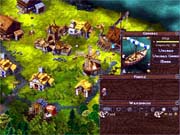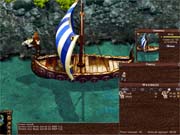In many ways, Cultures 2 plays like a typical city-building game. You drop buildings on the map, the raw materials roll in, and the finished products roll out. Grow more people, gather more resources, and then do it all again. Prosperity ensues. But what's unique about Cultures 2 is that it focuses on something far more interesting than buildings: people. This makes for an enthralling combination of city building and role-playing, with enough personality, activity, and variety to do justice to both genres.

Much like in other city-building games, in Cultures 2, you preside over a teeming community of little computer people. As the game progresses, your people learn. Each person is a unique character who can be assigned a career. As they go about their careers, their skills improve. As their skills improve, new careers are opened to them. This is important because the structures you can build are determined by the skills your people have learned. For instance, at the beginning of the game, you can't build a bakery, because it requires a milling skill of 10. But to build a mill at which a particular character can increase his milling skill, you need an agriculture skill of 10. So you have to start out with a farmer, promote him to a miller, and then promote him to a baker. As he learns these skills, the game opens up and allows more possibilities, such as carpentry, stonework, pottery, smithies, herbs, livestock, and more.
There's a lively ant farm of a game here, brimming over with detail and personality. Characters walk, eat, sleep, and talk to each other for entertainment. Couples marry. Babies are born, grow up, and are assigned careers of their own. You can give your little people shoes, tools, homes, and spouses. You can stock their houses with furniture and crockery for cooking. Since you can take direct control of your people, Cultures 2 plays a little like PopTop Studios' 2001 strategy game Tropico, but without any of that pesky autonomy.
The game's framework of resources, prerequisites, and interdependencies can be confusing at first, but the interface does an admirable job of smoothing out the complexity. Whenever something needs your attention, a little banner appears at the top of the screen and sticks around until the problem has been resolved. From the easy-to-read tech tree, to the figures on each building's supplies and demands, to the sortable lists--if you need to know it, Cultures 2 makes it easy for you to find.
There are some elements of the game (such as trading and "asking" women to have children, which you'll need to do regularly if you want your population to grow) that require a bit too much micromanagement. But in a way, games like this are all about micromanagement. If you don't like juggling construction, harvesting, production, and careers, you're probably playing the wrong game. Another problem with city-building games like this is that the amount of information you have to follow eventually reaches critical mass and will implode with the slightest misstep. However, Cultures 2 has a very forgiving difficulty level and pace. With the exception of getting a hero character killed, there are very few ways to fail a scenario outright.
In many city-building games, including the first Cultures, combat is usually problematic. But Cultures 2 has a much-improved combat system. You train generic soldiers, but you can differentiate your troops by the giving them different weapons and teaching them different skills. You can even give soldiers magic items and have them man catapults to attack cities. You can give units attack settings, group them, and command them to eat and sleep as a team. It's not quite full-fledged real-time strategy combat, but it's far better than the combat in most city-building games.
The game's 2D graphics are bright, colorful, cartoon-like, and occasionally too busy. It's possible to lose characters in the foliage, and it can be hard to pick out a particular person from a group. But on the whole, Cultures 2 is an attractive game with charming artwork. The sound consists of a pastoral collection of twittering birds, clucking chickens, and hammering hammers. Characters talk in vaguely Nordic muttering, and you'll hear the occasional belch or fart, which is probably supposed to pass for humor.

The campaign follows your group of Vikings as they do what Vikings do best: Leave Greenland and sail around, visiting a bunch of different places. The campaign offers just enough of a narrative to move the game forward without simply throwing arbitrary objectives at you. The locations, which range from Normandy to Baghdad, are each represented by a sprawling map. As you explore each map, you'll uncover quests, treasure chests, resources, wild animals, and other settlements you can trade with or fight. The graphics for the settlements and their citizens give the locations some nice flavor, and you'll even encounter quasi-historical personalities like Sinbad and Robin Hood.
Unfortunately, the only characters who carry over between scenarios are the heroes--hard-coded characters scripted to appear at certain times. Ironically, these are the least interesting characters in the game. They don't have skills, they can't be trained, they can't be equipped with inventory items, and they'll spend most of a scenario waiting around for a fight while everyone else is pitching in to build the settlement. Apparently that's the advantage of being a hero: not having to work anymore.
In addition to the campaign, you can play individual missions separately. Cultures 2 also has some interesting scenarios specifically designed for multiplayer games, with emphasis on military or economic goals. But good luck finding opponents--the game's servers seem to have absolutely no activity. Fortunately, you can play multiplayer scenarios as skirmish games against the computer.
Cultures 2 is a clever variation on the city-building theme. By placing more importance on the people than the buildings, it gives a little bit of The Sims' dollhouse quality to the more epic genre of city building. Cultures 2's graphics are cartoonlike and the micromanagement it requires can be a handful, but it's still one of the better city-building games out there.